University ICT Project Management Report: PMBOK and PRINCE2
VerifiedAdded on 2023/06/09
|7
|1148
|439
Report
AI Summary
This report provides a detailed analysis of ICT project management, focusing on the comparison of two prominent methodologies: PMBOK (Project Management Body of Knowledge) and PRINCE2 (Projects IN Controlled Environments). The report begins by defining methodology and its significance in project management, emphasizing its role in planning, controlling, and delivering projects effectively. It then contrasts PMBOK and PRINCE2, highlighting their differences in structure, nature (descriptive vs. prescriptive), and the inclusion of interpersonal skills. The report further explores the application of both methodologies within the project life cycle, outlining the distinct phases of PMBOK (Initiation, Planning, Execution, Controlling, and Closing) and PRINCE2 (Directing, Starting, Initiation, Managing Stage Boundaries, Controlling, and Closing). This comparative analysis offers valuable insights into the strengths and weaknesses of each methodology, providing a comprehensive overview for project management professionals and students alike.
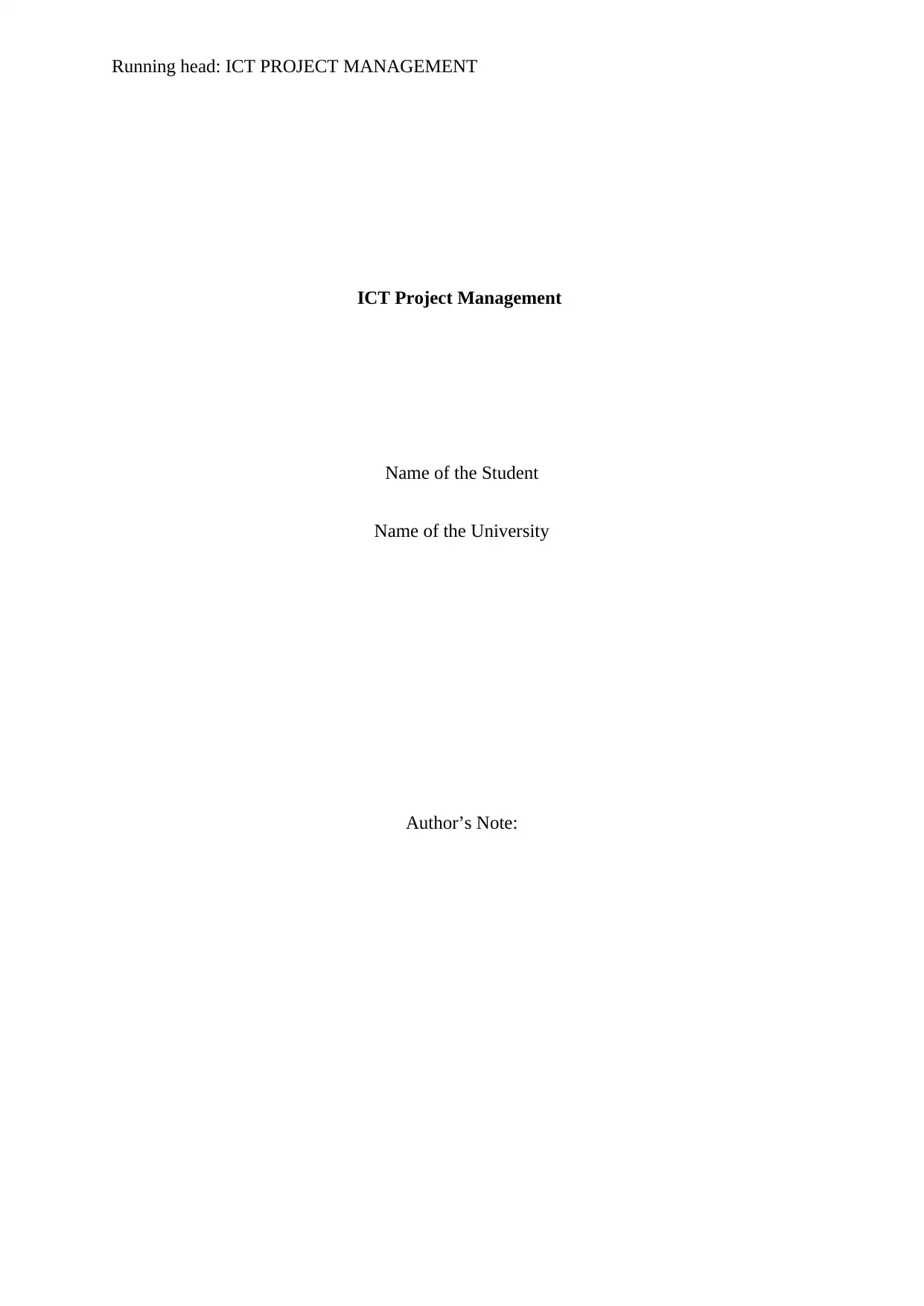
Running head: ICT PROJECT MANAGEMENT
ICT Project Management
Name of the Student
Name of the University
Author’s Note:
ICT Project Management
Name of the Student
Name of the University
Author’s Note:
Paraphrase This Document
Need a fresh take? Get an instant paraphrase of this document with our AI Paraphraser
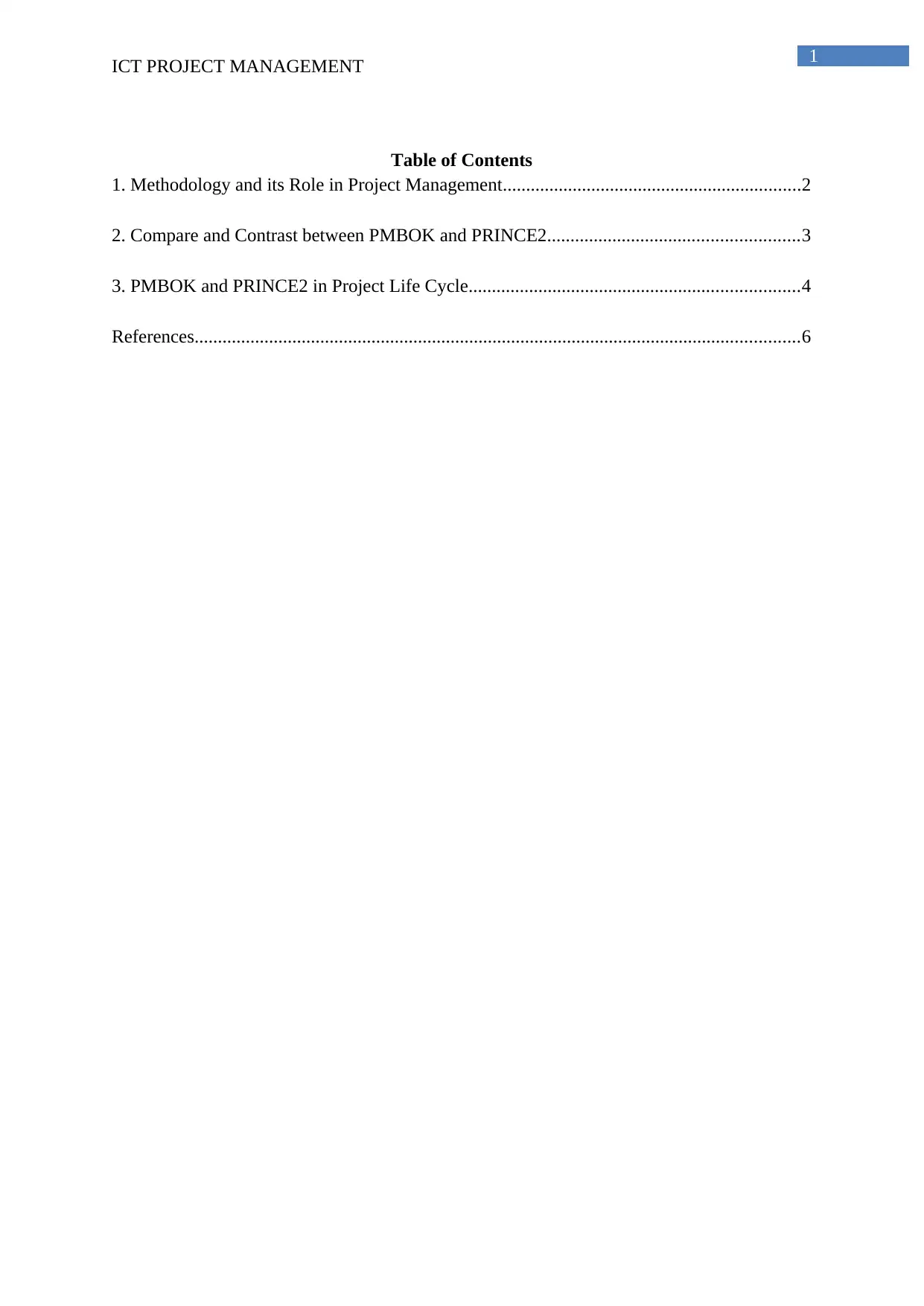
1
ICT PROJECT MANAGEMENT
Table of Contents
1. Methodology and its Role in Project Management................................................................2
2. Compare and Contrast between PMBOK and PRINCE2......................................................3
3. PMBOK and PRINCE2 in Project Life Cycle.......................................................................4
References..................................................................................................................................6
ICT PROJECT MANAGEMENT
Table of Contents
1. Methodology and its Role in Project Management................................................................2
2. Compare and Contrast between PMBOK and PRINCE2......................................................3
3. PMBOK and PRINCE2 in Project Life Cycle.......................................................................4
References..................................................................................................................................6
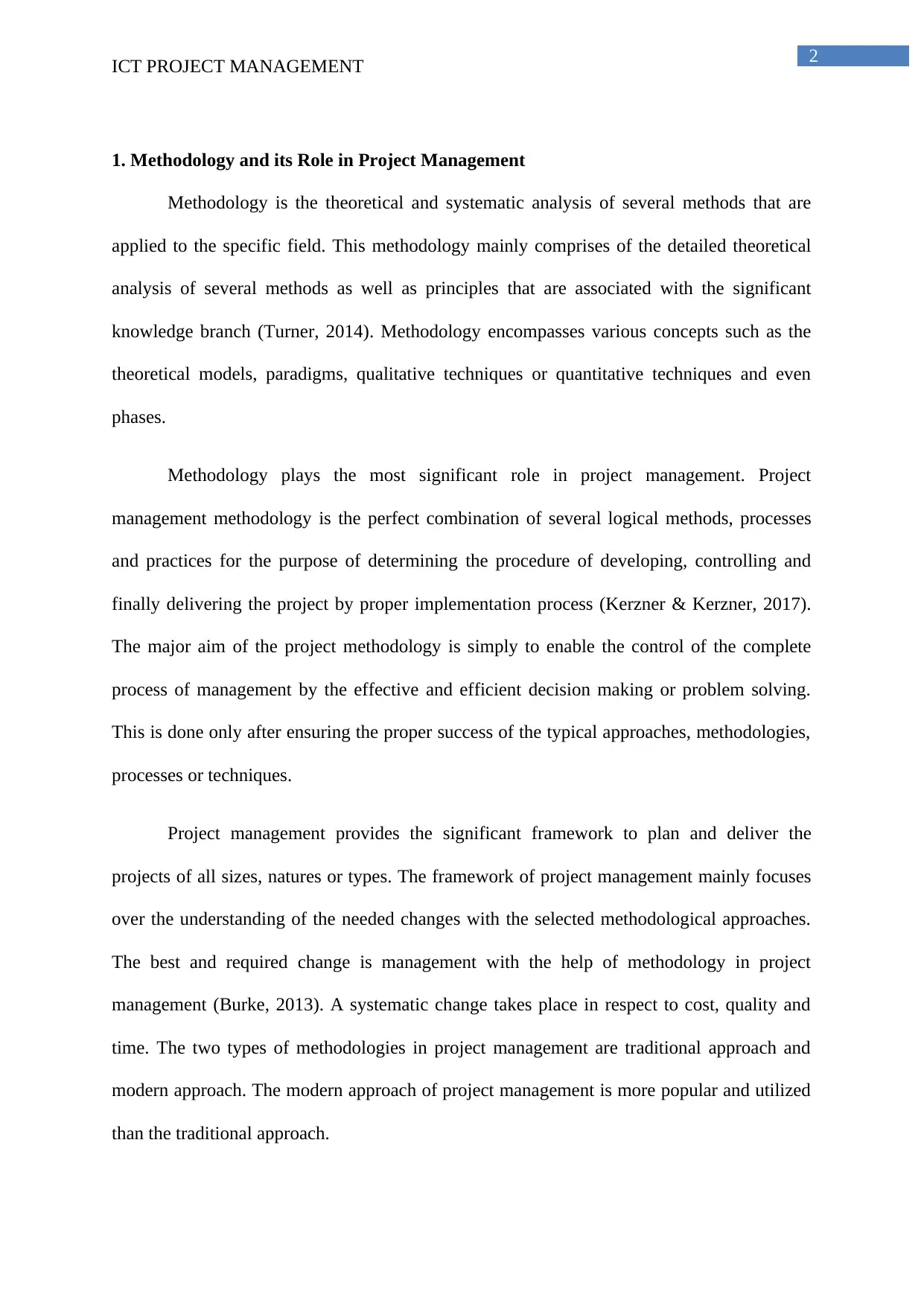
2
ICT PROJECT MANAGEMENT
1. Methodology and its Role in Project Management
Methodology is the theoretical and systematic analysis of several methods that are
applied to the specific field. This methodology mainly comprises of the detailed theoretical
analysis of several methods as well as principles that are associated with the significant
knowledge branch (Turner, 2014). Methodology encompasses various concepts such as the
theoretical models, paradigms, qualitative techniques or quantitative techniques and even
phases.
Methodology plays the most significant role in project management. Project
management methodology is the perfect combination of several logical methods, processes
and practices for the purpose of determining the procedure of developing, controlling and
finally delivering the project by proper implementation process (Kerzner & Kerzner, 2017).
The major aim of the project methodology is simply to enable the control of the complete
process of management by the effective and efficient decision making or problem solving.
This is done only after ensuring the proper success of the typical approaches, methodologies,
processes or techniques.
Project management provides the significant framework to plan and deliver the
projects of all sizes, natures or types. The framework of project management mainly focuses
over the understanding of the needed changes with the selected methodological approaches.
The best and required change is management with the help of methodology in project
management (Burke, 2013). A systematic change takes place in respect to cost, quality and
time. The two types of methodologies in project management are traditional approach and
modern approach. The modern approach of project management is more popular and utilized
than the traditional approach.
ICT PROJECT MANAGEMENT
1. Methodology and its Role in Project Management
Methodology is the theoretical and systematic analysis of several methods that are
applied to the specific field. This methodology mainly comprises of the detailed theoretical
analysis of several methods as well as principles that are associated with the significant
knowledge branch (Turner, 2014). Methodology encompasses various concepts such as the
theoretical models, paradigms, qualitative techniques or quantitative techniques and even
phases.
Methodology plays the most significant role in project management. Project
management methodology is the perfect combination of several logical methods, processes
and practices for the purpose of determining the procedure of developing, controlling and
finally delivering the project by proper implementation process (Kerzner & Kerzner, 2017).
The major aim of the project methodology is simply to enable the control of the complete
process of management by the effective and efficient decision making or problem solving.
This is done only after ensuring the proper success of the typical approaches, methodologies,
processes or techniques.
Project management provides the significant framework to plan and deliver the
projects of all sizes, natures or types. The framework of project management mainly focuses
over the understanding of the needed changes with the selected methodological approaches.
The best and required change is management with the help of methodology in project
management (Burke, 2013). A systematic change takes place in respect to cost, quality and
time. The two types of methodologies in project management are traditional approach and
modern approach. The modern approach of project management is more popular and utilized
than the traditional approach.
⊘ This is a preview!⊘
Do you want full access?
Subscribe today to unlock all pages.

Trusted by 1+ million students worldwide
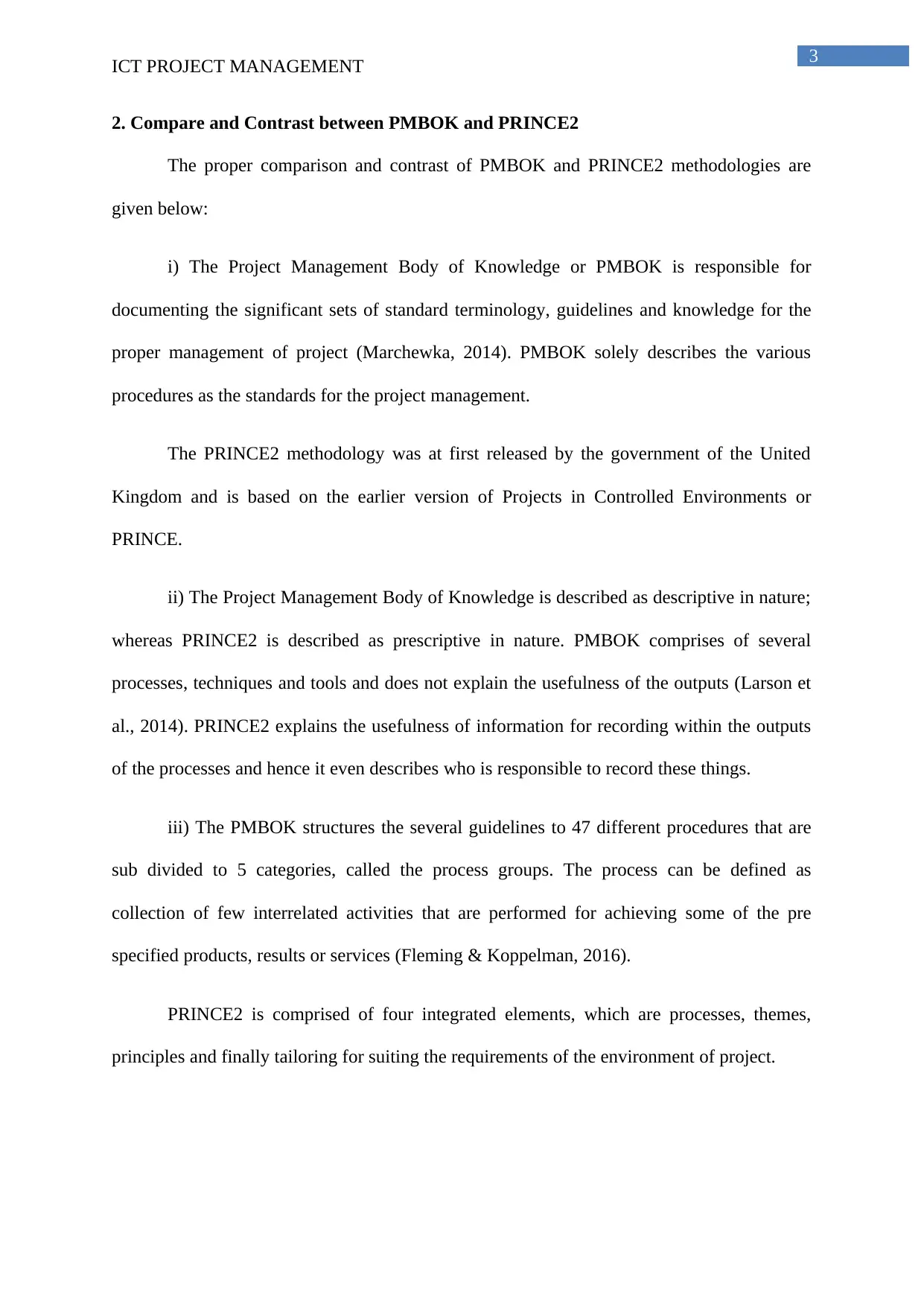
3
ICT PROJECT MANAGEMENT
2. Compare and Contrast between PMBOK and PRINCE2
The proper comparison and contrast of PMBOK and PRINCE2 methodologies are
given below:
i) The Project Management Body of Knowledge or PMBOK is responsible for
documenting the significant sets of standard terminology, guidelines and knowledge for the
proper management of project (Marchewka, 2014). PMBOK solely describes the various
procedures as the standards for the project management.
The PRINCE2 methodology was at first released by the government of the United
Kingdom and is based on the earlier version of Projects in Controlled Environments or
PRINCE.
ii) The Project Management Body of Knowledge is described as descriptive in nature;
whereas PRINCE2 is described as prescriptive in nature. PMBOK comprises of several
processes, techniques and tools and does not explain the usefulness of the outputs (Larson et
al., 2014). PRINCE2 explains the usefulness of information for recording within the outputs
of the processes and hence it even describes who is responsible to record these things.
iii) The PMBOK structures the several guidelines to 47 different procedures that are
sub divided to 5 categories, called the process groups. The process can be defined as
collection of few interrelated activities that are performed for achieving some of the pre
specified products, results or services (Fleming & Koppelman, 2016).
PRINCE2 is comprised of four integrated elements, which are processes, themes,
principles and finally tailoring for suiting the requirements of the environment of project.
ICT PROJECT MANAGEMENT
2. Compare and Contrast between PMBOK and PRINCE2
The proper comparison and contrast of PMBOK and PRINCE2 methodologies are
given below:
i) The Project Management Body of Knowledge or PMBOK is responsible for
documenting the significant sets of standard terminology, guidelines and knowledge for the
proper management of project (Marchewka, 2014). PMBOK solely describes the various
procedures as the standards for the project management.
The PRINCE2 methodology was at first released by the government of the United
Kingdom and is based on the earlier version of Projects in Controlled Environments or
PRINCE.
ii) The Project Management Body of Knowledge is described as descriptive in nature;
whereas PRINCE2 is described as prescriptive in nature. PMBOK comprises of several
processes, techniques and tools and does not explain the usefulness of the outputs (Larson et
al., 2014). PRINCE2 explains the usefulness of information for recording within the outputs
of the processes and hence it even describes who is responsible to record these things.
iii) The PMBOK structures the several guidelines to 47 different procedures that are
sub divided to 5 categories, called the process groups. The process can be defined as
collection of few interrelated activities that are performed for achieving some of the pre
specified products, results or services (Fleming & Koppelman, 2016).
PRINCE2 is comprised of four integrated elements, which are processes, themes,
principles and finally tailoring for suiting the requirements of the environment of project.
Paraphrase This Document
Need a fresh take? Get an instant paraphrase of this document with our AI Paraphraser
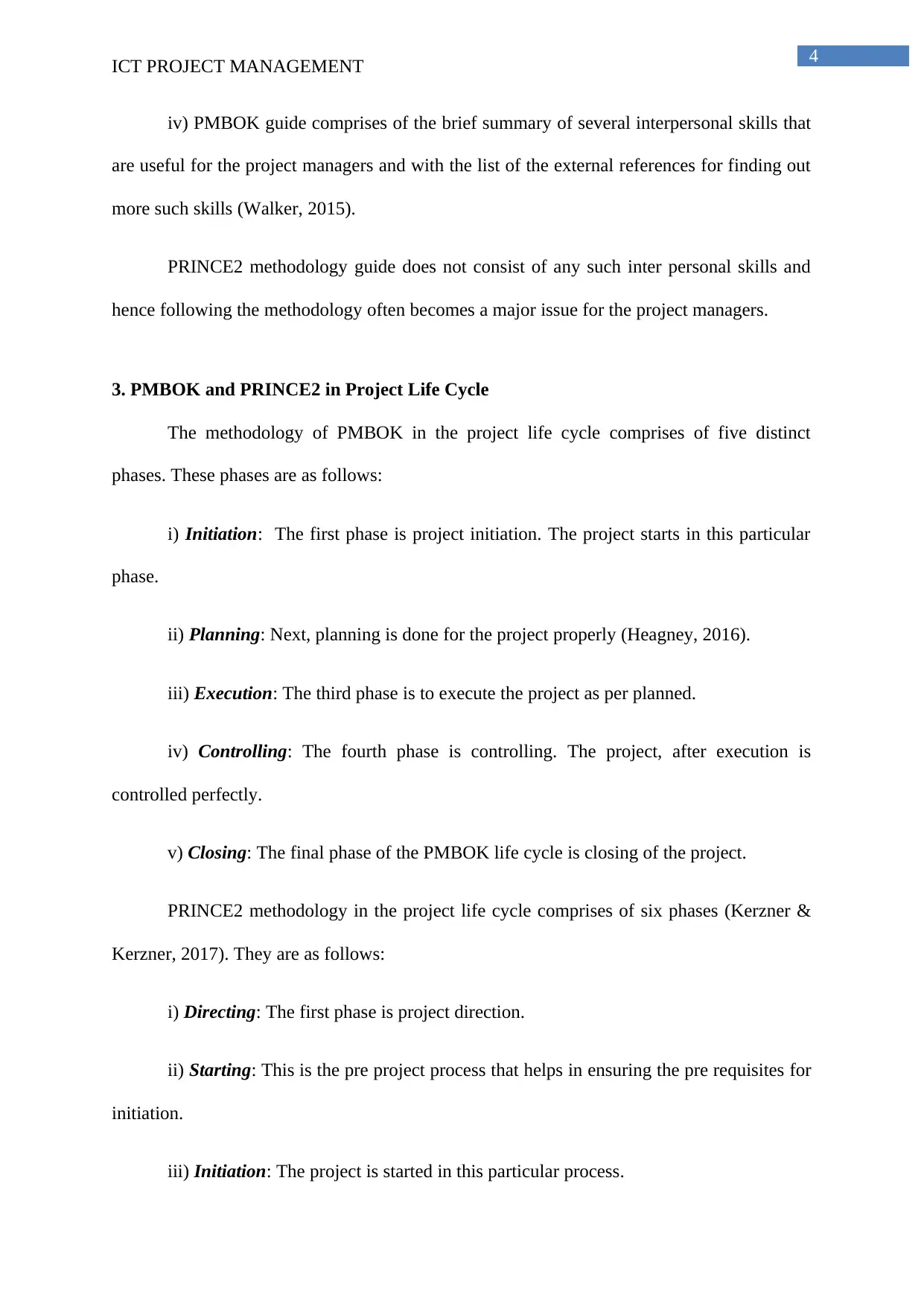
4
ICT PROJECT MANAGEMENT
iv) PMBOK guide comprises of the brief summary of several interpersonal skills that
are useful for the project managers and with the list of the external references for finding out
more such skills (Walker, 2015).
PRINCE2 methodology guide does not consist of any such inter personal skills and
hence following the methodology often becomes a major issue for the project managers.
3. PMBOK and PRINCE2 in Project Life Cycle
The methodology of PMBOK in the project life cycle comprises of five distinct
phases. These phases are as follows:
i) Initiation: The first phase is project initiation. The project starts in this particular
phase.
ii) Planning: Next, planning is done for the project properly (Heagney, 2016).
iii) Execution: The third phase is to execute the project as per planned.
iv) Controlling: The fourth phase is controlling. The project, after execution is
controlled perfectly.
v) Closing: The final phase of the PMBOK life cycle is closing of the project.
PRINCE2 methodology in the project life cycle comprises of six phases (Kerzner &
Kerzner, 2017). They are as follows:
i) Directing: The first phase is project direction.
ii) Starting: This is the pre project process that helps in ensuring the pre requisites for
initiation.
iii) Initiation: The project is started in this particular process.
ICT PROJECT MANAGEMENT
iv) PMBOK guide comprises of the brief summary of several interpersonal skills that
are useful for the project managers and with the list of the external references for finding out
more such skills (Walker, 2015).
PRINCE2 methodology guide does not consist of any such inter personal skills and
hence following the methodology often becomes a major issue for the project managers.
3. PMBOK and PRINCE2 in Project Life Cycle
The methodology of PMBOK in the project life cycle comprises of five distinct
phases. These phases are as follows:
i) Initiation: The first phase is project initiation. The project starts in this particular
phase.
ii) Planning: Next, planning is done for the project properly (Heagney, 2016).
iii) Execution: The third phase is to execute the project as per planned.
iv) Controlling: The fourth phase is controlling. The project, after execution is
controlled perfectly.
v) Closing: The final phase of the PMBOK life cycle is closing of the project.
PRINCE2 methodology in the project life cycle comprises of six phases (Kerzner &
Kerzner, 2017). They are as follows:
i) Directing: The first phase is project direction.
ii) Starting: This is the pre project process that helps in ensuring the pre requisites for
initiation.
iii) Initiation: The project is started in this particular process.

5
ICT PROJECT MANAGEMENT
iv) Managing Stage Boundaries: This process gives the project managers with major
decision points for continuing with the project (Burke, 2013).
v) Controlling: The project is controlled in this stage.
vi) Closing: In this final phase, the project is closed eventually.
ICT PROJECT MANAGEMENT
iv) Managing Stage Boundaries: This process gives the project managers with major
decision points for continuing with the project (Burke, 2013).
v) Controlling: The project is controlled in this stage.
vi) Closing: In this final phase, the project is closed eventually.
⊘ This is a preview!⊘
Do you want full access?
Subscribe today to unlock all pages.

Trusted by 1+ million students worldwide
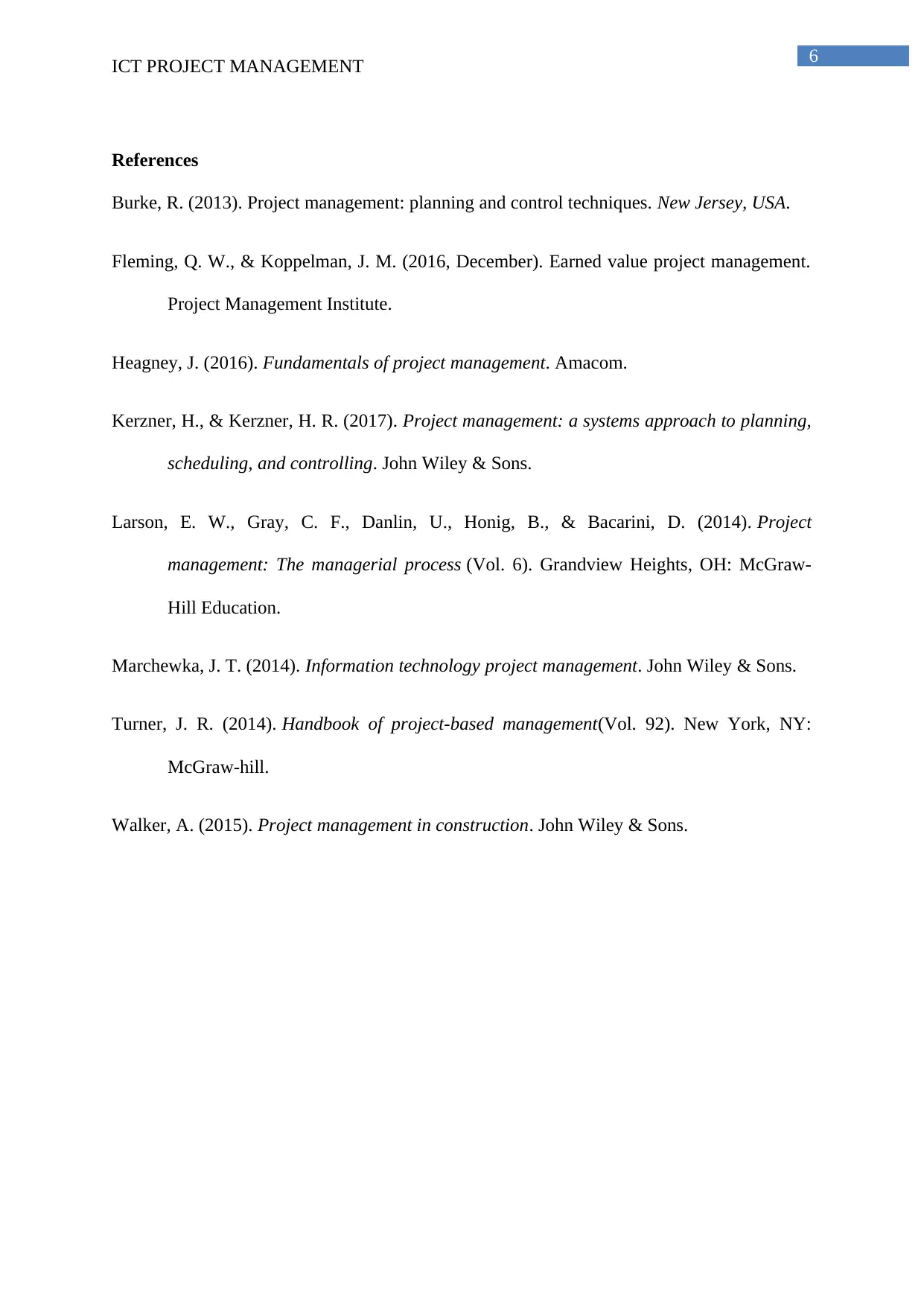
6
ICT PROJECT MANAGEMENT
References
Burke, R. (2013). Project management: planning and control techniques. New Jersey, USA.
Fleming, Q. W., & Koppelman, J. M. (2016, December). Earned value project management.
Project Management Institute.
Heagney, J. (2016). Fundamentals of project management. Amacom.
Kerzner, H., & Kerzner, H. R. (2017). Project management: a systems approach to planning,
scheduling, and controlling. John Wiley & Sons.
Larson, E. W., Gray, C. F., Danlin, U., Honig, B., & Bacarini, D. (2014). Project
management: The managerial process (Vol. 6). Grandview Heights, OH: McGraw-
Hill Education.
Marchewka, J. T. (2014). Information technology project management. John Wiley & Sons.
Turner, J. R. (2014). Handbook of project-based management(Vol. 92). New York, NY:
McGraw-hill.
Walker, A. (2015). Project management in construction. John Wiley & Sons.
ICT PROJECT MANAGEMENT
References
Burke, R. (2013). Project management: planning and control techniques. New Jersey, USA.
Fleming, Q. W., & Koppelman, J. M. (2016, December). Earned value project management.
Project Management Institute.
Heagney, J. (2016). Fundamentals of project management. Amacom.
Kerzner, H., & Kerzner, H. R. (2017). Project management: a systems approach to planning,
scheduling, and controlling. John Wiley & Sons.
Larson, E. W., Gray, C. F., Danlin, U., Honig, B., & Bacarini, D. (2014). Project
management: The managerial process (Vol. 6). Grandview Heights, OH: McGraw-
Hill Education.
Marchewka, J. T. (2014). Information technology project management. John Wiley & Sons.
Turner, J. R. (2014). Handbook of project-based management(Vol. 92). New York, NY:
McGraw-hill.
Walker, A. (2015). Project management in construction. John Wiley & Sons.
1 out of 7
Related Documents
Your All-in-One AI-Powered Toolkit for Academic Success.
+13062052269
info@desklib.com
Available 24*7 on WhatsApp / Email
![[object Object]](/_next/static/media/star-bottom.7253800d.svg)
Unlock your academic potential
Copyright © 2020–2025 A2Z Services. All Rights Reserved. Developed and managed by ZUCOL.





